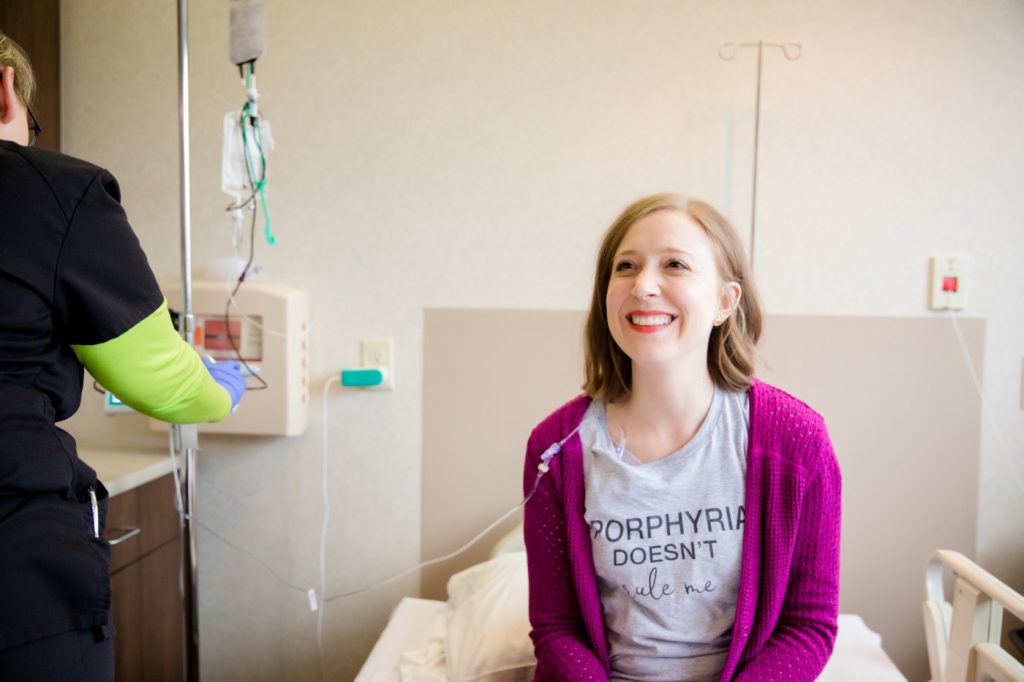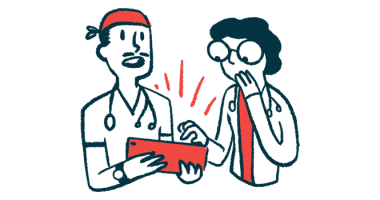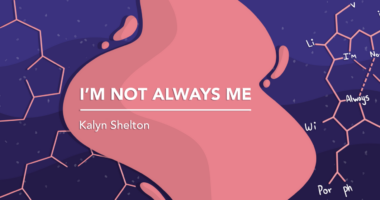Unexplained Pain and My 19-year Search for Answers

When Desiree Lyon, founder of the American Porphyria Foundation, described to a doctor her first attack of acute intermittent porphyria (AIP) at the age of 17, she likened it to “a thousand flaming swords” embedded into her abdomen. I think of her words often, as I’ve struggled throughout my life to describe to others the excruciating, suffocating, and incapacitating pain I endure.
Tolerating large amounts of pain is not a trait I was born with. It’s a skill I’ve honed after years of practice and disturbing amounts of disassociation. For me, it was a survival tactic.
Here’s the deal: For most of my life, I have been plagued by intermittent bursts of a thousand flaming swords with no explanation or proven medical reason as to why. Sometimes the episodes last hours, while other times they continue for more than a month.
Porphyria attacks vary for each individual, but mine typically progress over a period of days with the following symptoms: constipation, abdominal distension, anxiety, insomnia, muscle weakness, crazy amounts of abdominal pain, leg pain, reddish urine, nausea, vomiting, gastroparesis, paralytic ileus, rapid heart rate, high blood pressure, and in my most severe condition, limb paralysis.
My first porphyria attack happened at age 14, and I spent a weekend in bed with my curtains drawn. A blur of doctors followed, and I was given my very first of many misdiagnoses: fibromyalgia. I went for years without another acute episode. But in my 20s, attacks became more frequent and severe. By 30, I was functioning with high levels of pain, anxiety, and fatigue as a baseline, with a smattering of acute flare-ups. Living with AIP is a lesson in enduring deep uncertainty and living in the moment, as symptoms come and go.
My diagnostic journey was tricky because AIP is known as the “little imitator.” It looks like many more common diseases and can only be diagnosed by a genetic test, so it often gets missed again and again. Imagine having an attack and seeking emergency help, only to feel better in a few days. Follow-up appointments were confusing for me, and I often didn’t properly advocate for myself, entrusting my doctor with discovering what had happened through diagnostic testing. Additionally, my chronic symptoms didn’t seem to correlate with the attacks; these included neuropathy, fatigue, and severe neck and shoulder pain.
In my 19-year search for answers, I saw more than 20 specialists in five states who tested me for hundreds of conditions. Along the way, I picked up a whole bunch of ailments to add to my first misdiagnosis. By my mid-30s, I had amassed quite a collection, many of them related to my mental health and being a woman. Some of my favorites are endometriosis, intestinal infections, intussusception, gall bladder issues, functional abdominal pain, irritable bowel syndrome, generalized anxiety disorder, depression, borderline personality disorder, chronic constipation, and bad period cramps.
In the worst of times, I received these misdiagnoses while immobilized with pain in a hospital bed, and they accompanied not-so-secret comments from my medical team about being a “drug seeker” or “wanting attention.” Sadly, my story is not uncommon in the porphyria community.
I finally received my diagnosis at age 33 from a resident at the Mayo Clinic who was working with my medical team, a group of doctors who never considered my condition could be explained by anything more than excess stool in my colon. When I learned the reason for my pain was an inherited metabolic disorder, I felt a 7,000-pound weight of shame removed from my shoulders. This is because a strange thing had happened after I was told for many years that I was mentally unwell: I eventually believed it.
I cried tears of joy. For the first time in my life, a doctor had given me a real reason for my pain. Out of the way, you dumb, old, fake diagnoses, I have a proven, shiny, proper one now!
Fortunately, AIP is one of the few rare diseases with a treatment. One day, I received a sheet of paper in the mail with an adorable set of numbers and letters printed on it indicating my genetic abnormality. Immediately, I grabbed my phone and snapped a photo of the medical record so I could carry it with me everywhere. Now, no one can deny my pain or tell me it’s in my head.
Facing and processing the trauma of being dismissed by the very people who swore an oath to protect me was an important step in learning to live with porphyria.
In my new column, “One Thousand Flaming Swords,” I will share some of the mindfulness and self-compassion tactics I learned. This space will focus on navigating daily living with AIP and how I accept my body despite its limitations of chronic and acute symptoms. Expect entertaining and meaningful stories of my life as an advocate, symptoms task manager, and hunter of joy amid pain. Thank you for accompanying me on this adventure!
***
Note: Porphyria News is strictly a news and information website about the disease. It does not provide medical advice, diagnosis, or treatment. This content is not intended to be a substitute for professional medical advice, diagnosis, or treatment. Always seek the advice of your physician or other qualified health provider with any questions you may have regarding a medical condition. Never disregard professional medical advice or delay in seeking it because of something you have read on this website. The opinions expressed in this column are not those of Porphyria News or its parent company, Bionews, and are intended to spark discussion about issues pertaining to porphyria.








Comments
Mia Ellis
I can't wait to read more, Claire! Thank you for letting the rest of us learn from you.
Claire Richmond
Thank you for helping me tell my story, Mia! I'm insanely lucky to have you in my corner.
Susan Mastrangelo
When I read your story I started to cry even before I was halfway through because it was like I was reading my own story.
Claire Richmond
Susan- as much as I hate making people cry, in this case I'm so glad you can relate. Our stories are our superpowers, they can teach, connect and promote healing. I hope you are in a better place these days, hugs to you!
Barbara Bradbury
It was useful to know your 2 types of attacks and the length of each. However I wonder why the concentration on hormones? Will your regime work after menopause. There are many, many people beyond the menopause having attacks, which worsen with age.
Claire Richmond
Hi Barbara- thank you for your comments. I’m writing from my experience, my attacks help me better set up expectations, but medications and diet can still throw in unplanned flares. Relying on menstral cycles is my attempt at finding control amid the uncertainty! For post-menopause, I have talked to some who have it easier and to some it gets worse. Regardless of how you cut it, it’s a challenging disease to live with! Thank you again!
Wendy Cummings
Wow. I’m nearly speechless. As I read, I felt like I was telling my story (but in a much more concise way). I, too, was recently diagnosed at Mayo in January 2020, after nearly 25 years (over half my life) of appts, unnecessary procedures/surgeries, and misdiagnoses. IMO, the only reason drs began taking my symptoms more seriously, was when my 2 year old son began presenting similar symptoms. He’s now 9, and just like me experiences the most rare form, and presentation of symptoms. In hindsight, every. single. symptom makes sense now. Thank you for sharing! I look forward to following you.
Claire Richmond
Hi Wendy! Thank you for your feedback, I am so happy to connect with you! Isn't it so enlightening once you have an answer, to go back and look through your history of symptoms and struggles to connect the dots? Wishing you and your son the best.
Burcu Ozturk-Hismi, M.D.
As a metabolic physician taking care of children and adults with rare inherited metabolic disease, I learn a lot from my patients and their caregivers. Thanks for sharing your story with us. I also wondered whether your mother was also checked for porphyria, as it's inheritance is autosomal dominant and colonic inertia can occur due to porphyria neuropathy of the gut.
wish you and your mom all the best from İstanbul Turkey :)
Claire Richmond
Hi Doctor Ozturk-Hismi: Strangely enough, I got the AIP gene from my father. And he has zero digestive disease issues or any other porphyria-like problems! Thank you for reading and for reaching out. I'm so glad we can learn from each other! - Claire
Tamara Schroyer
Thank you for sharing your story. I'm still trying to get a confirmed diagnosis for AIP, despite it running in my family. I've struggled with disbelief from doctors in my area who have no interest in assisting me in getting a diagnosis, and have flat out said so, that they'd rather shrug and refer me to specialist over a hundred miles from me, boggles my mind. But it has been my reality for over ten yrs now. It has made me reluctant to even seek help at times. Thru research I've learned how to handle my episodes the best I can, but when, despite my best efforts I have a attack that disables me and I must seek a Doctor's care, it is usually a frustrating experience since some dr.s refuse to even consider the possibility of porphyria. To further complicate things, neither the hospitals or labs have the capability to even do the tests, which require special containers and protocols. I have been disappointed that even the porphyria foundation is not very helpful in helping you get a diagnosis. I once travelled to Philly for an appt, only to go home without anything more helpful than instructions on how the tests could've accurately done, and the name of a trusted lab in Tx who doesn't take insurance. So you must pay cash upfront, and just the RPG test is over $800. And I still have to find a lab to prepare the test properly.
I am encouraged each time I read a story like yours, that someday I'll get confirmation either way. If you have any tips to share on how you did finally get a Dr. To Hear you.. I'm all ears. The episode I'm in now, has me all but on my knees and my Dr. Scratching her head, and suggesting a different specialist and/or tests.
I came here looking for answers, and found some hope in your story at least. Thank you.
Claire Richmond
Hi Tamara- Landing upon AHP as a possible diagnosis is hard enough, but then to continue being met with roadblocks to testing is traumatic. I'm so sorry you're going through this. This is not an uncommon problem and there is a free resource for people with symptoms and a family history, like you: https://www.invitae.com/en/alnylam-act-ahp/ While this doesn't take away any of the frustrating and painful gaslighting you've endured up until this point, I hope it can help you get some answers. Thank you for reading and reaching out! - Claire